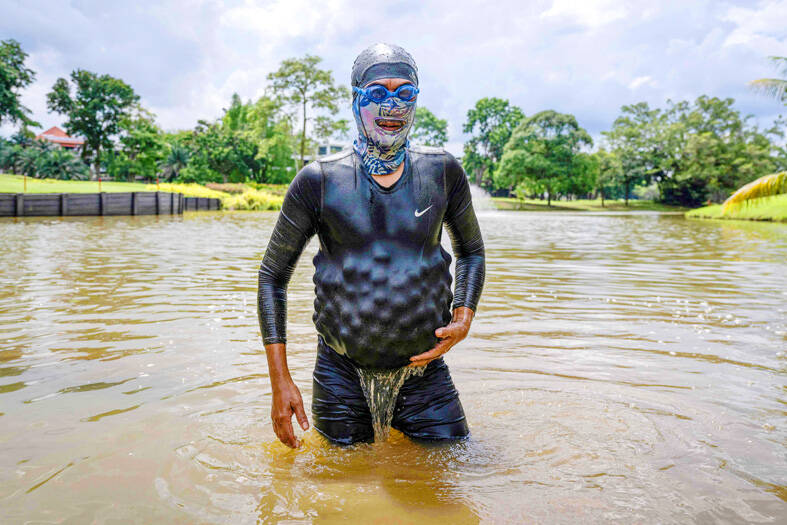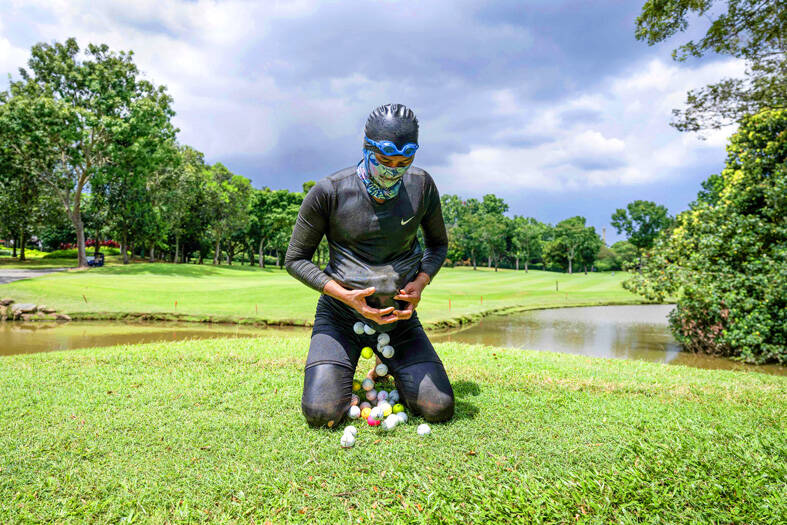After two decades plunging into Malaysian seas to defend his country, navy frogman Sumadi Ibrahim has retired to the golf course — diving water hazards to retrieve mis-hit balls to make a living.
For 22 years Sumadi served in the Royal Malaysian Navy, deployed aboard ships patrolling the shark-riddled waters off the Pacific archipelago.
Now as darkness falls, the 51-year-old roams the suburban fairways of Selangor state outside Kuala Lumpur, splashing into ponds as he hunts for balls sliced astray by day.

Photo: AFP
On each expedition he collects 500 to 600 — selling his haul back to the same frustrated golfers who lost them.
With his seafaring days behind him, Sumadi could have chosen a more conventional life. However, he could not resist the call of the deep — even if the golf course ponds only go 2m down.
“I’m used to being in the sea,” he said with a nostalgic smile softening his face.

Photo: AFP
Sumadi first heard about the lucrative niche of “golf ball diving” in a casual conversation with friends.
Intrigued by the prospect, he put his specialist skills to use — entering the murky waters for the first time back in 2012. Since his 2014 retirement it has been his main source of income.
Three nights every week, when the manicured greens are doused in darkness, Sumadi plunders the balls in a floral balaclava.
“I don’t bring along a flashlight. Only the moonlight is my source of light,” he chuckled. “I use my hands as wipers. When my hands and feet come into contact with a certain object, I’m able to tell whether it’s a ball or otherwise.”
Using no breathing equipment, he collects the balls by stuffing them down his long-sleeve shirt — emerging from the water with them bunched and bobbling around his midriff.
His work might seem less risky than his military past, but it has its set of challenges. The waters are cold and dark, testing his physical endurance and mental resilience.
“The lakes often harbor palm thorns, debris and splintered shells of snails. The water is dark so I often step on them,” he said.
“I’m always worried about getting cramps. So, to mitigate the risk, I hired a part-time assistant to keep watch while I dive,” he added. “If something happens, like I get stuck or injured, at least there’s someone to help me.”
His payday comes every Saturday when he sets up a modest stall at the golf course entrance at 8:00am sharp, selling his wares in bundles of 20.
Displayed on a makeshift rack and in baskets, standard balls retail for as little as 0.70 ringgit (US$0.16) each whilst premium brands fetch up to 6 ringgit.
Sumadi’s job earns him up to 8,000 ringgit each month — about three times the median monthly salary of formally employed Malaysians, according to June data from the country’s statistics bureau.
The sport of golf has long been criticized for its environmental impact — clearing tracts of wildland to make way for lawns preserved for the elite and requiring huge amounts of water.
Sumadi does not claim to be an environmentalist. However, by removing thousands of golf balls containing plastic and rubber from the ecosystem he is making his own small contribution.
Among his customers is businessman Gilbert Tan.
“I have purchased used golf balls from him several times,” 30-year-old Tan said.
“As you know, plastics are not really biodegradable. So, with me purchasing recycled balls, I’m doing my part to help the environment,” he added.
Sumadi is modest about his impact, but proud about presiding over his underwater domain.
“I treat the golf course as my own home,” he said. “I’ll keep diving as long as I can.”

TAKING STOCK: A Taiwanese cookware firm in Vietnam urged customers to assess inventory or place orders early so shipments can reach the US while tariffs are paused Taiwanese businesses in Vietnam are exploring alternatives after the White House imposed a 46 percent import duty on Vietnamese goods, following US President Donald Trump’s announcement of “reciprocal” tariffs on the US’ trading partners. Lo Shih-liang (羅世良), chairman of Brico Industry Co (裕茂工業), a Taiwanese company that manufactures cast iron cookware and stove components in Vietnam, said that more than 40 percent of his business was tied to the US market, describing the constant US policy shifts as an emotional roller coaster. “I work during the day and stay up all night watching the news. I’ve been following US news until 3am

UNCERTAINTY: Innolux activated a stringent supply chain management mechanism, as it did during the COVID-19 pandemic, to ensure optimal inventory levels for customers Flat-panel display makers AUO Corp (友達) and Innolux Corp (群創) yesterday said that about 12 to 20 percent of their display business is at risk of potential US tariffs and that they would relocate production or shipment destinations to mitigate the levies’ effects. US tariffs would have a direct impact of US$200 million on AUO’s revenue, company chairman Paul Peng (彭雙浪) told reporters on the sidelines of the Touch Taiwan trade show in Taipei yesterday. That would make up about 12 percent of the company’s overall revenue. To cope with the tariff uncertainty, AUO plans to allocate its production to manufacturing facilities in

Six years ago, LVMH’s billionaire CEO Bernard Arnault and US President Donald Trump cut the blue ribbon on a factory in rural Texas that would make designer handbags for Louis Vuitton, one of the world’s best-known luxury brands. However, since the high-profile opening, the factory has faced a host of problems limiting production, 11 former Louis Vuitton employees said. The site has consistently ranked among the worst-performing for Louis Vuitton globally, “significantly” underperforming other facilities, said three former Louis Vuitton workers and a senior industry source, who cited internal rankings shared with staff. The plant’s problems — which have not

COLLABORATION: Given Taiwan’s key position in global supply chains, the US firm is discussing strategies with local partners and clients to deal with global uncertainties Advanced Micro Devices Inc (AMD) yesterday said it is meeting with local ecosystem partners, including Taiwan Semiconductor Manufacturing Co (TSMC, 台積電), to discuss strategies, including long-term manufacturing, to navigate uncertainties such as US tariffs, as Taiwan occupies an important position in global supply chains. AMD chief executive officer Lisa Su (蘇姿丰) told reporters that Taiwan is an important part of the chip designer’s ecosystem and she is discussing with partners and customers in Taiwan to forge strong collaborations on different areas during this critical period. AMD has just become the first artificial-intelligence (AI) server chip customer of TSMC to utilize its advanced